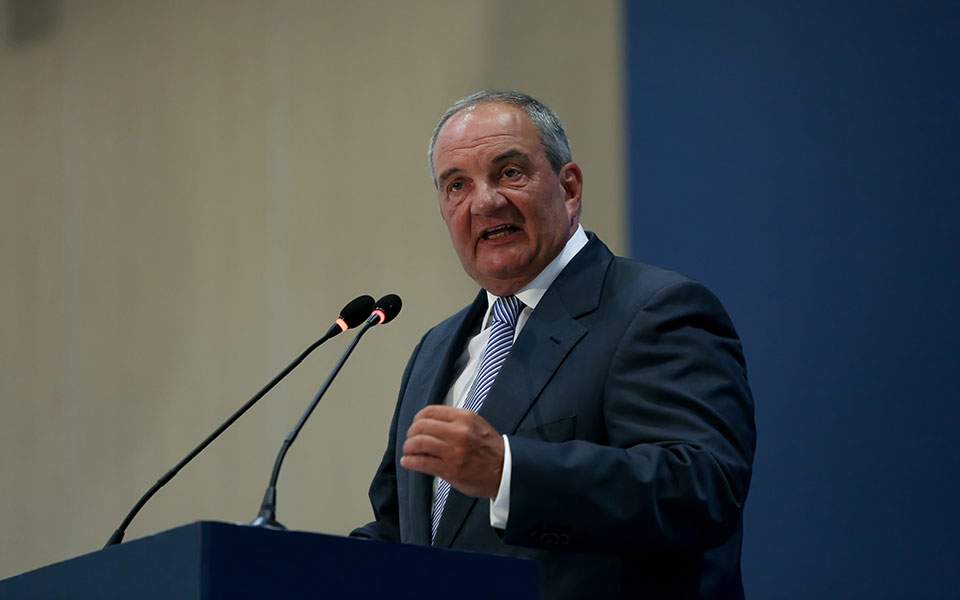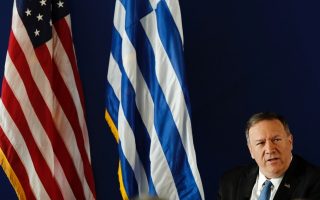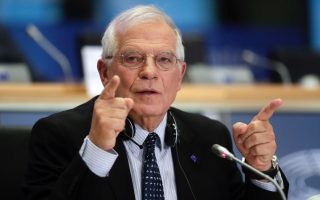Ex-PM Karamanlis warns Greece faces major challenges

Former Prime Minister Costas Karamanlis warns that Greece faces major challenges ahead, in the escalation of Turkey’s challenge to its sovereignty, the migration issue, Europe’s reluctance to assume a leading role, US unpredictability and what he termed as “major weaknesses” of the Prespa Agreement with North Macedonia.
Karamanlis, who led a conservative government from 2004 to 2009 and was leader of the New Democracy party for 12 years, was the keynote speaker Sunday at the 80th Anniversary event of the Macedonian Studies Society (EMS) in Thessaloniki.
Karamanlis had remained largely silent over the past decade in the face of a barragfe of criticism over his administration’s leaving behind huge deficits that helped precipitate Greece’s financial crisis.
The former prime minister did not address the past, but decided to focus on challenges coming from abroad, as well as on a vibrant defense of the Greek character of Macedonia. Karamanlis’ family comes from Serres, in the Greek province of Macedonia.
In the years to come, Karamanlis said, Greece will face great challenges that will require concerted policies, determination and courage, and governments we will need to make difficult decisions and implement them consistently and with discipline.
Unpredictable US behavior
Referring to the international arena, Karamanlis noted that "we have entered a phase of growing uncertainty, exacerbated by the often unpredictable behavior of the United States that raises questions of consistency and credibility."
This unpredictable US behavior, he said, "is reflected on major issues: from the so-called Arab Spring and the (US’) contradictions on the Syrian issue to its inconsistent behavior towards Turkey."
"Antagonisms, regional conflicts, trade wars and frequent changes in the balance of power, behaviors and alignments make the international scene much more volatile than any other time since World War II. This reality is reflected with particular intensity in our wider neighborhood, that is, Southeastern Europe, the Eastern Mediterranean, the Middle East," Karamanlis said.
Turkey’s blatant escalation
"There is no doubt that we are facing a blatant escalation from Turkey, from Evros to Cyprus. A planned and systematic escalation,” Karamanlis said. “We now know where Ankara's strategic moves are aimed at,” he added.
“Past experience has shown that Greece must not be provoked by Turkey's machinations and should not allow faits accomplish against its sovereignty. We must be in a constant state of alert and readiness. Because, let's have no doubt about it, defending our sovereign rights and national interests will depend on us. We must present a unified front and ensure the deterrent power of our armed forces. "
"With Turkey, our relations are being constantly tested by its arbitrary claims. Addressing them requires seriousness, long-term planning and initiatives on all fronts. Greece has chosen International Law as its main weapon against these claims. We must at the same time work continuously to highlight the problem as one between Turkey and Europe and not merely as a bilateral one,” Karamanlis said, adding that strong regional ties are crucial.
The former PM rejected recommendations and exhortations to Greece to accommodate itself with Turkey, saying that such advice “from friends, allies or partners” cannot be accepted if it is contrary to national interest.
Karamanlis added that Turkey should honor its Agreement with the European Union on the issue of refugees and migrants, noting that any obstructions, evasions and efforts to further exploit the situation on its part should be acknowledged by EU, which should redefine its position toward Turkey.
Reluctant European Union
The former prime minister said that the situation has been exacerbated by the European Union's "reluctance" so far to assume its role as a strong international player.
"Today's Europe appears introverted, cumbersome, unable to make critical decisions and undertake initiatives," and cited as a glaring example its perceived inability to formulate a clear and effective policy on refugee and migration issues.
Migration is a difficult, major and urgent issue that will intensify in the future, and dealing with it in terms of humanitarian, solidarity and financial support is indeed imperative, but insufficient, he noted.
Flawed Prespa Agreement
Concerning the Prespa Agreement, Karamanlis said that Greece did not adequately exploit the precedent he himself had set when he had vetoed Northern Macedonia’s entry into NATO in 2008 and that developments have revealed the “major weaknesses” of this agreement.
“We could have demanded and achieved much more. Recent developments have confirmed that others were eager to join NATO and the EU and they still had much to prove. After all, it seems that their issues are more than those with Greece,” he said. As for the position of Northern Macedonia, he stressed that countries aspiring – sooner or later – to become members of the European Union must fully adopt and implement European behavior, European principles and values. “One should not assume that by signing the Prespa Agreement, it automatically receives a ticket to the European Union,” he added.
Also attending the event was Greek President Prokopis Pavlopoulos, who was honored by EMS with a medal. Karamanlis’ praise of Pavlopoulos was interpreted by some as an endorsement of his re-election to a second 5-year term. The Greek Parliament must vote on a new President in February 2020.
[ANA-MPA]





